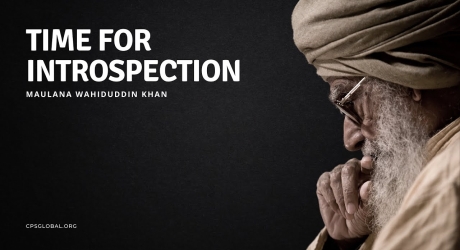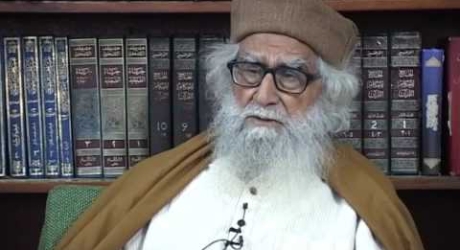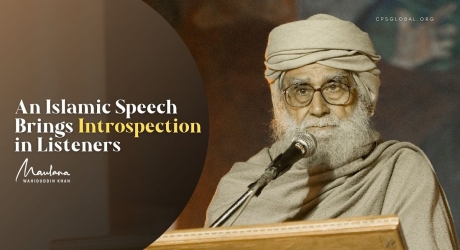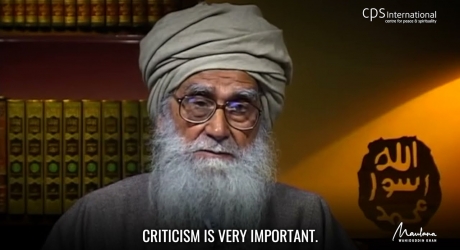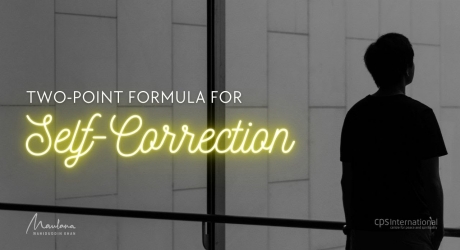De-conditioning of the mind can only be done by one process alone: introspection. This is a continuous, merciless examination of ourselves to improve. This improvement can come in two ways. First, one is to accept the harsh criticism of others by acknowledging their external ‘hammering’ with an open mind. Without being off ended, one should take on board harsh criticism from others and, after an objective analysis, carry out a complete re-assessment of oneself. The other method of de-conditioning can be called ‘self-hammering’. This is to look at ourselves with a critical eye, evaluate ourselves day and night, perceive every mistake with severity, and then introspect by mercilessly ‘hammering’ ourselves without giving ourselves any concessions. Instead of accusing others, we should analyse ourselves objectively and find our faults. These are the only two possible ways of de-conditioning. Either one accepts the ‘hammering’ of others, or one becomes one’s own worst critic by ‘self-hammering’. The one who likes to hear good things about himself from others and makes excuses for his mistakes will always remain a conditioned person and will never be able to decondition or purify his mind.
Introduction
De-conditioning of mind refers to the tearing apart of the veil of traditional thinking and re-designing one’s personality in accordance with the laws of nature. This is a crucial requirement for man, given that each person is a case of conditioning.
The importance of availing the chance
De-conditioning enables a man to perceive that which lies beyond the ostensible. Let me consider my own example. I received formal education at a seminary (madrasa), which imparted traditional Islamic learning. As I graduated, I realised that this knowledge was not sufficient; it was required that the modern mind was addressed in its idiom. I was then guided by the following Hadith, which said,
“A momin must know the deen (religion) and the world he lives in.”
(Ibn-Hibban)
Due to their lack of understanding, the Muslims have wrongly divided the world between deen (religion) and duniya (modern material world). This erroneous dichotomy conditioned minds all over the world. The correct division would have been - deen, duniya and zamana (contemporary world). The above Hadith therefore implies that a believer is one who has re-discovered the religion in his contemporary idiom.
This inspired me to learn about the world I lived in. As I learnt English and studied the existing translations of the Quran, I was appalled to find that none of them clearly conveyed the word of God. This motivated me to take up the task of producing a more comprehensible translation of the Quran. I prayed to God thus,
“Oh! God, I am ready to do this task but only hands will be mine,
the pen will be Yours!”
The new translation of the Quran
As I saw the new translation of the Quran today, I remembered an instance once quoted in the Reader’s Digest magazine. It narrated the story of an Arab Bedouin who became extremely wealthy in the wake of the revolution brought about by oil production in the Middle Eastern nations. A friend of the Bedouin bought a house for him in
This journey of publishing the Quran was marred by struggles. While a fatwa forbid the publishing of the Quran without its text, yet another fatwa refrained the spreading of the Quran, on grounds of irreverence. It was during such times that the following Hadith guided me,
“No house on Earth – big or small – will remain but God’s Word shall enter into it.”
(Musnad Ahmad)
I realised that the contradiction was too apparent because the coming to fruition of the aforementioned Hadith seemed unlikely in the wake of such stringent fatwas. I therefore embarked upon the journey of objectively analysing the authenticity of such fatwas, To do so, I had to immensely de-condition myself and simultaneously understand the origin of such conditioning. My study made me realise that this conditioning was a result of false propagation of ideas. As their empires began to disintegrate and wars were fought, the Muslims became obsessed with the wrongfully propagated ideas of jihad. They considered it to be the panacea of all their ills. The ideas of violent activism became so popular that they obliterated the concept of dawah work from the texts of Islamic jurisprudence. Muslims, therefore fell pray to conditioning at a universal level and forgot that the landscape of the world had changed and religious freedom was prevalent everywhere. Instead they grew so negative about the world around them that they even failed to realise the world of opportunities that had opened for them to disseminate the Word of God.
The process of De-conditioning
According to a verse in the Quran,
“We have indeed created man in the best of mould,
then We cast him down as the lowest of low.” (95:4-6)
This verse implies that along with the stupendous creation of the entire universe, God created man – a remarkable being! The ‘low’ here is suggestive of the desire that man was created with.
Despite being endowed with superlative capabilities, man deviates and succumbs to temptations. The de-conditioning at individual level would mean that man begins to understand that he is being misled and learns to overcome his whims.
De-conditioning (tazkia) is a very difficult process but it has been given such importance in the Quran that a verse states,
“He who purifies it will indeed be successful, and he who corrupts it is sure to fail.” (91:9-10)
God created man as a pure being. Even the famous Russian write, Tolstoy floated the idea of ‘Return to Boyhood’ because, children he said were innocent and free from vengeance and subjectivity. However, as a child grows in the society, he gets shrouded by veils of conditioning emanating from cultural, educational and civilizational influences. Tazkia serves as a means of introspection by way of which the outer peels of conditioning may be cast away and the bulb at the core (real personality) is retrieved. Sufis erroneously popularised tazkia as a heart-based activity. But researches in science validated the concept of mind-based tazkia by proving that heart was merely a pump.
Conclusion
The life of the Prophet exemplified the struggle for doing dawah work. He embodied the true values of Islam - well-wishing, patience, compassion and tolerance – expected of a dayee. Muslims have still not realised that the present world is one that promotes religious tolerance. All countries of the world are members of the United Nations and have signed the UN Charter, which aims at promoting peace.
It is crucial to understand that in the present times, democracy, printing press and communication technology have opened up opportunities hitherto unheard of. It is time Muslims stop bemoaning the disintegration of Muslims Empires and overcome their siege mentality. They must recognise the glaring dawah-work prospects that have presented themselves today. Instead of complaining, they must channelise their strength in doing dawah work.
At individual level, therefore, man must learn to manage his temptations and overcome the feelings of hatred and malice. It is equally important that at the level of community, the Muslims are able to break their conditioning and avail the world of opportunities that galore. May God bless us in our dawah endeavours!





